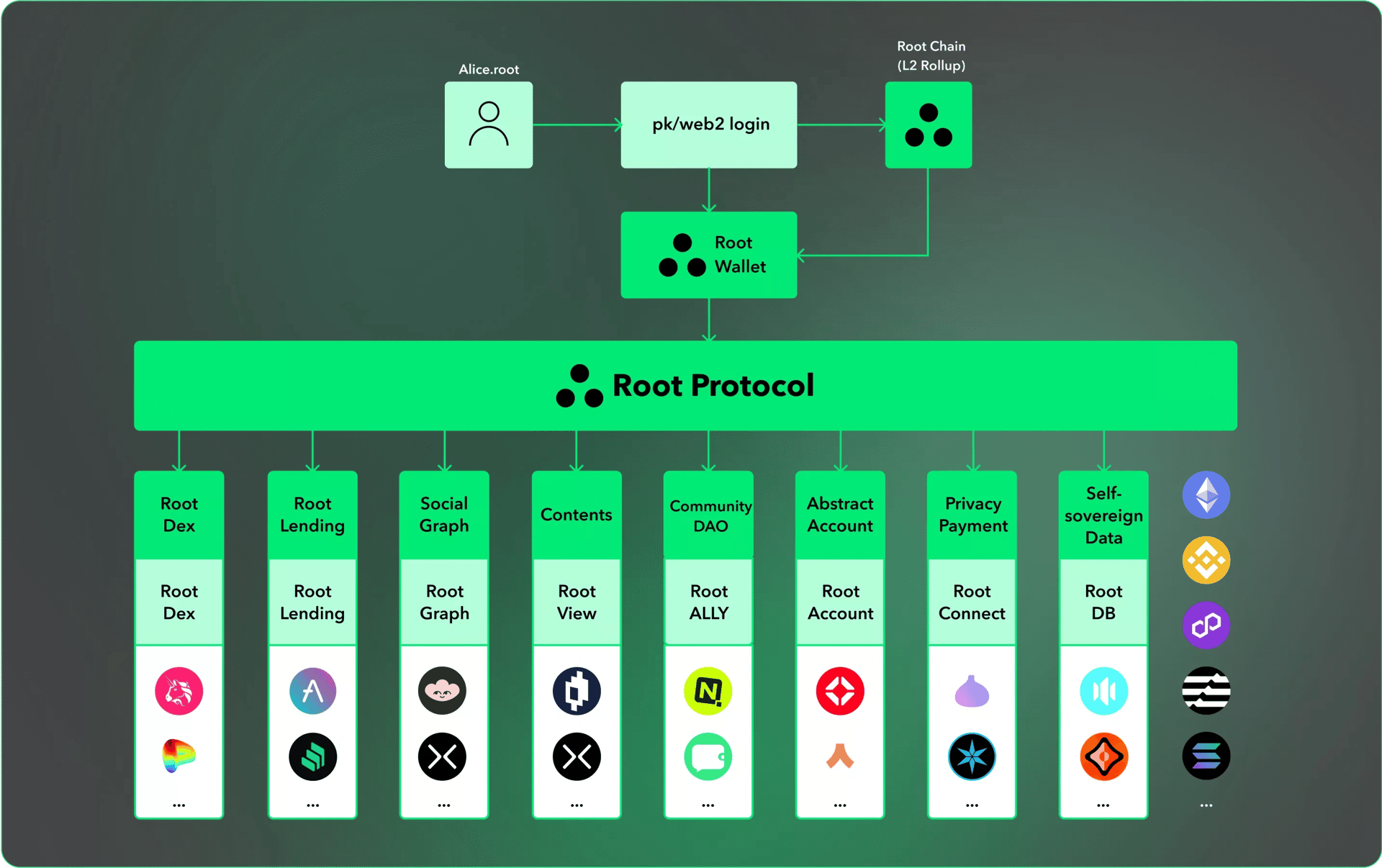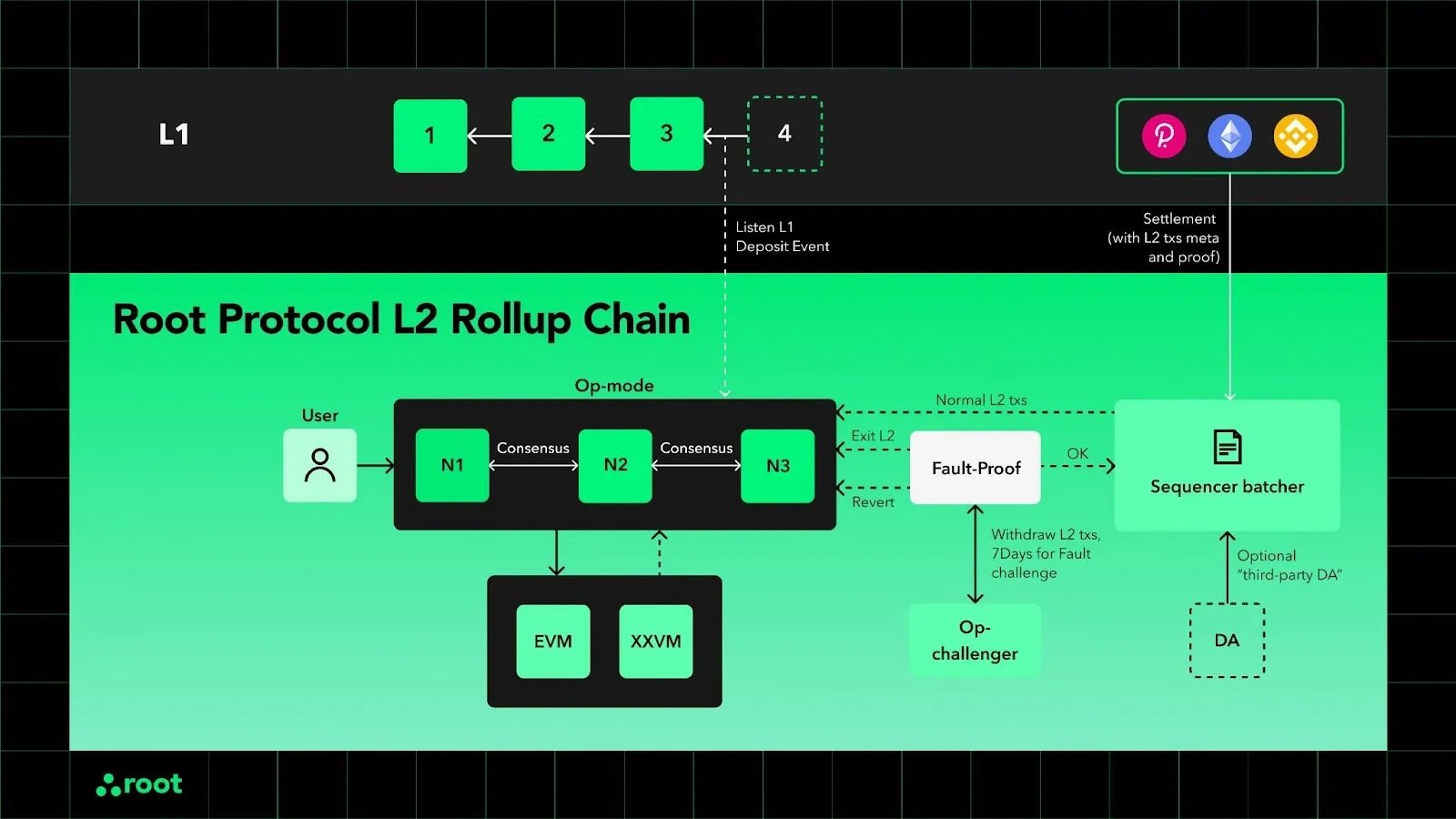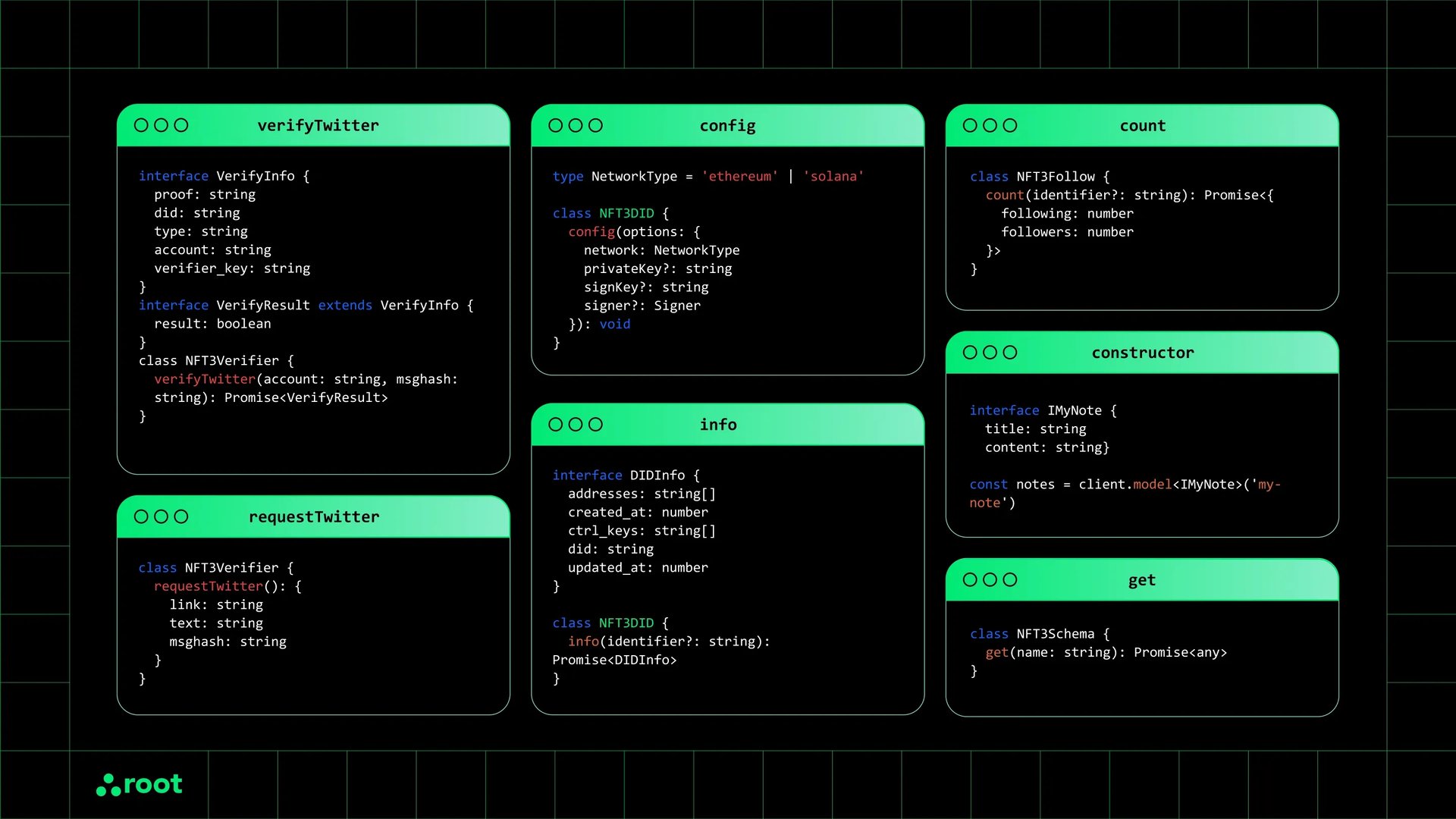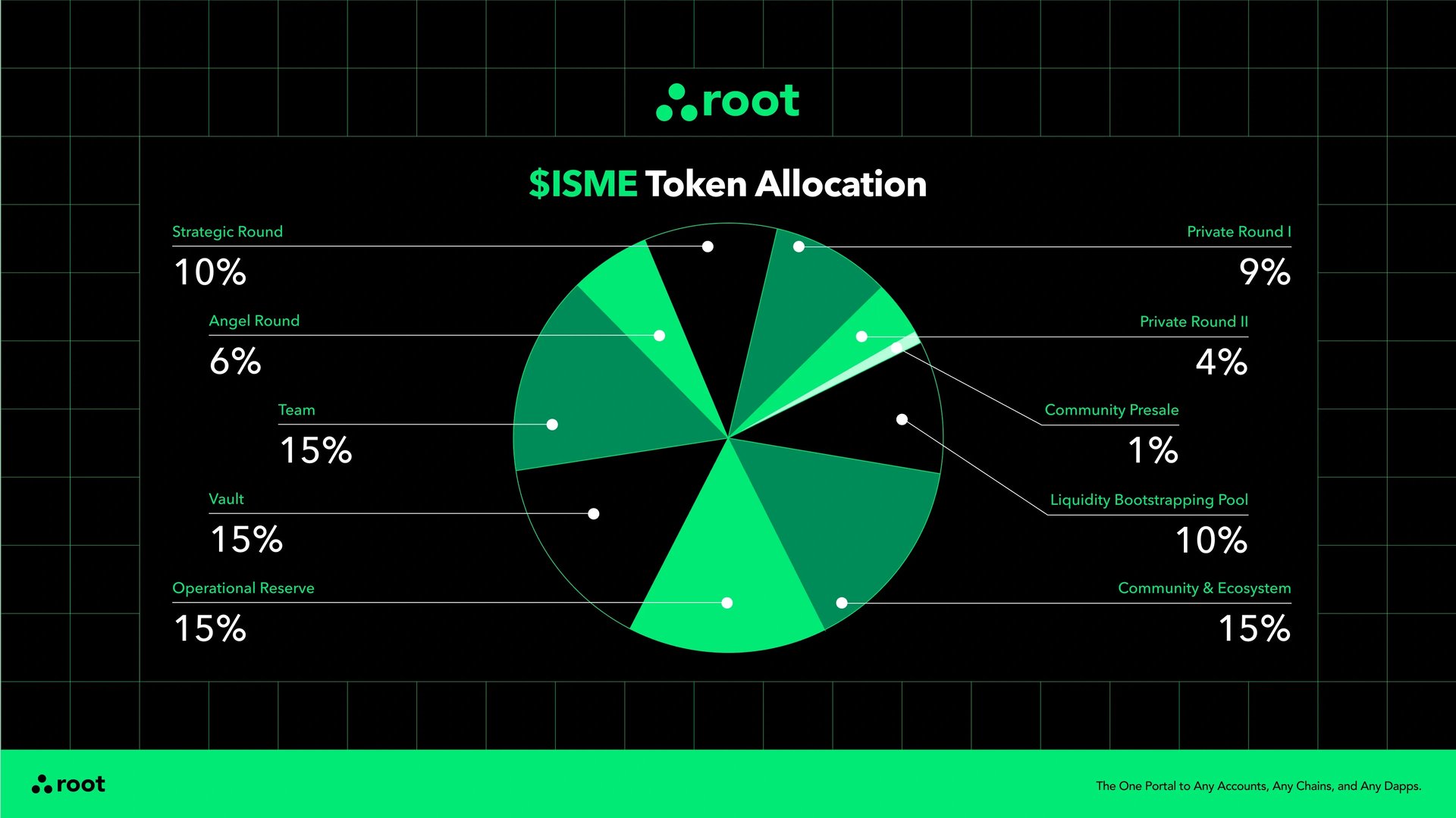위키 구독하기
Share wiki
Bookmark
Root Protocol
0%
Root Protocol
Root Protocol은 디지털 ID, 가상 계정 및 소셜 그래프를 통합하여 Web3 애플리케이션에 대한 액세스를 간소화하고 통합하도록 설계된 분산형 플랫폼입니다. 분산형 프로토콜 및 체인 전반에서 사용자 상호 작용, 자산 관리 및 가치 교환을 간소화하는 것을 목표로 합니다. [1]
개요
Root Protocol은 디지털 ID, 가상 계정 및 소셜 그래프를 통합하여 Web3에 대한 액세스를 통합하도록 설계된 프레임워크입니다. Web3 애플리케이션 전반에서 중앙 집중식 ID 프레임워크 역할을 하여 상호 작용, 자산 관리 및 가치 교환을 간소화합니다. 프로토콜 및 체인을 집계하면 간소화된 Web3 상호 작용이 가능해 플랫폼 전반에서 통합된 보기, 자동화된 트랜잭션 및 휴대용 분산형 ID(Root DID)를 제공합니다. Root OS는 이메일 및 소셜 로그인과 같은 친숙한 온보딩 방법을 도입하고 분산형 애플리케이션과 상호 작용하기 위한 통합 인터페이스를 제공하여 접근성을 향상시킵니다. 개방형 스마트 계약 및 투명한 데이터를 통해 Root Protocol은 사용자에게 디지털 활동 및 데이터에 대한 더 큰 제어 권한을 부여합니다. [2]
제품

Root Wallet
Root Wallet은 Web3 액세스 및 자산 관리를 간소화하도록 설계된 Root Protocol용 모바일 우선 클라이언트입니다. 보안 키 관리 및 소셜 복구를 위해 임계값 암호화를 활용하여 기존 개인 키 또는 Google, Twitter 및 Telegram과 같은 Web2 소셜 계정을 포함한 로그인 방법을 지원합니다. 모바일 앱과 브라우저 확장 프로그램으로 모두 사용할 수 있으며 Web3 애플리케이션 및 프로토콜과의 상호 작용을 간소화합니다. 인터페이스는 원활한 사용자 경험을 위해 트랜잭션에 가장 적합한 프로토콜을 자동으로 선택하는 집계된 프로토콜 보기와 크로스 체인 자산 관리를 통해 직접 dApp 상호 작용을 위한 고급 모드의 두 가지 모드를 제공합니다. 기능에는 Web2 및 Web3 소셜 그래프 통합과 AI 기반 의도 인식이 포함되어 스마트 운영을 생성하여 사용성을 향상시킵니다. [2] [3]
Root Account
Root Account는 Root Protocol 내의 고유 식별자로, 사용자가 “Alice.root”와 같은 개인화된 도메인과 유사한 이름을 주장할 수 있습니다. 각 계정은 여러 체인에서 일관된 주소를 가진 추상 계약(ERC-4337 스마트 지갑)에 연결됩니다. 이 설정을 통해 사용자는 체인 전체에서 균일한 주소와 권한을 유지하여 프로토콜 내에서 상호 작용 및 계정 관리를 간소화할 수 있습니다. [2] [3] [4]
Root Chain
Root Chain은 Ethereum Virtual Machine (EVM)과 호환되는 Layer 2 Rollup이며 Root Abstract Account를 통합합니다. 네트워크에 동기를 부여하기 위한 인센티브 메커니즘을 통합하면서 프로토콜 인덱서 및 운영 실행기의 워크로드 인증에 중점을 둡니다. [2] [3]

Root SDK
Root Network SDK는 Root Network와의 원활한 통합을 지원하여 개발자가 통합된 Web3 액세스를 위해 디지털 ID, 가상 계정 및 소셜 그래프를 결합한 의도 중심 시스템을 구축할 수 있도록 합니다. 자체 주권 디지털 ID 생성을 간소화하고, 다중 블록체인 상호 작용을 위한 가상 계정 관리를 용이하게 하며, 사용자 정의 가능한 소셜 연결 및 데이터 모델을 통해 분산형 애플리케이션을 구축하기 위한 도구를 제공합니다. SDK는 Root Network의 집계된 운영 체제에 대한 직접 액세스를 제공하여 Web3 애플리케이션의 상호 운용성, 확장성 및 향상된 사용자 경험을 촉진합니다. [2] [3] [5]

Root Omni Protocol
Root Omni Protocol은 Root Protocol의 핵심 구성 요소로, 다양한 Web3 프로토콜을 위한 통합 인터페이스를 제공합니다. Root Dex, Root Lending 및 Root Graph와 같은 기능을 결합하여 사용자가 여러 프로토콜을 탐색하지 않고도 자산을 교환하고, 대출 수익을 최적화하고, 집계된 소셜 데이터에 액세스할 수 있도록 합니다. [2] [3]
ISME
$ISME 토큰은 Root Protocol의 기본 유틸리티 토큰으로, 생태계 내에서 다양한 제품 및 서비스에 대한 액세스를 제공하도록 설계되었습니다. $ISME 토큰의 용도는 동적입니다. Root Protocol이 개발됨에 따라 거버넌스 투표, 트랜잭션 및 서비스 수수료 지불, 네트워크 보안 및 보상을 위한 스테이킹, 생태계 기여에 대한 사용자 보상 등 현재 유틸리티를 포함하여 확장될 것입니다. [6]
토큰노믹스

ISME의 총 공급량은 10억 개의 토큰이며 다음과 같이 할당됩니다. [2]
운영 준비금: 15%
커뮤니티 및 생태계: 15%
팀: 15%
보관소: 15%
유동성 부트스트래핑 풀: 10%
전략적 라운드: 10%
프라이빗 라운드 I: 9%
엔젤 라운드: 6%
프라이빗 라운드 II: 4%
커뮤니티 프리세일: 1%
자금 조달
2024년 1월 19일, Root Protocol은 두 번의 시드 라운드에서 1,000만 달러의 자금 조달을 마감하여 프로젝트 가치를 1억 달러로 평가했다고 발표했습니다. 자금 조달 라운드는 Animoca Ventures가 주도했으며 Shima Capital, DFG Group, Signum Capital, Ankr Network, Digital Strategies, CMS Holdings, Double Peak, GenBlock Capital 및 Cypher Capital을 포함한 전략적 투자자가 참여했습니다. 새로 발표된 투자자에는 Dao5와 Gate Labs Ventures가 포함되었습니다. [7]
파트너십
Mint
KaratDAO
Tilted
INTO
Digitalabs AI
FairFun
Novastro
Anome
WePunks
TONsale
Openpad
aZen Protocol
OEG DAO
잘못된 내용이 있나요?
